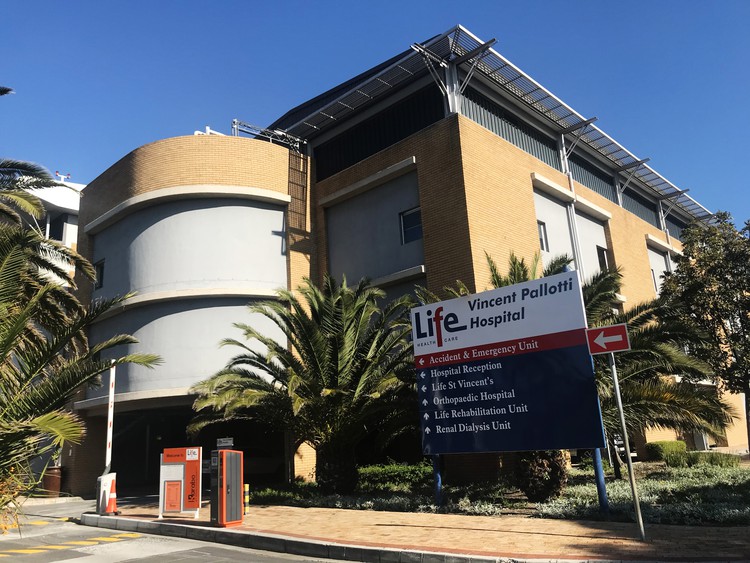Private hospital sends Covid-19 patient to stretched Groote Schuur
Life Vincent Pallotti defends its decision
Life Vincent Pallotti Hospital referred a Covid-19 patient who had no medical cover to Groote Schuur. Photo: Ashraf Hendricks
Just over a week ago, as Groote Schuur Hospital was scrambling to increase its capacity to take in new Covid-19 patients, a private Cape Town hospital, Life Vincent Pallotti, transferred a Covid-19 patient to Groote Schuur, a public hospital, because the patient did not have medical scheme cover.
On 21 May GroundUp reported that the number of Covid-19 patients at Groote Schuur Hospital in Cape Town was doubling every five days. We reported that the hospital was running seven wards with over 120 Covid-19 patients, and four intensive care units with 19 Covid-19 patients. Three of the wards were for confirmed Covid-19 cases, others were for suspected cases such as for people with respiratory illnesses. Since then, additional capacity has been added to the hospital to take in more patients.
Meanwhile we understand that Life Vincent Pallotti, located in Pinelands, had enough spare capacity to treat the patient.
On Tuesday Life Vincent Pallotti defended its position. In an email, spokesperson Ailsa Gouws, said, “In the event that a private or non-medical aid patient is admitted at a Life Healthcare hospital for medical treatment, it is standard procedure to stabilise the patient and provide treatment according to the doctors’ instructions. Private paying patients are only transferred if they are stable and willing to be transferred to another hospital.”
“In the event that a transfer is agreed to between the patient and the hospital, the treating specialist contacts the state hospital that the patient is being transferred to, to arrange a specialist to receive the patient on arrival and to ensure the availability of a vacant bed and resources. In this instance, protocol was followed and the patient was transferred.”
Western Cape Health Department spokesperson Mark Van der Heever said the Department was monitoring the situation. He said: “All our hospitals are experiencing an increase in admissions. With regard to clients on medical aid there are currently high level discussions also with National [government]. Nothing is finalised yet.”
The provincial government said in a statement that from 27 May that the public sector is planning to purchase 300 beds from the private sector. The statement also said that the increase in Covid-19 cases “has resulted in additional pressure on our health service, with our hospitals continuing to experience an increase in general admissions and ICU and High Care admissions”.
Additional hospital beds are also being set up in temporary care facilities, such as the CTICC (850 beds), Brackengate (330 beds), and the Thusong Centre in Khayelitsha (68 beds).
Editors’ comment
In normal times this story wouldn’t be newsworthy. Patients admitted to private hospitals who cannot afford to pay or who don’t have medical scheme cover are routinely transferred to public hospitals.
But these are not normal times. We are in the middle of a national — make that global — disaster. Everyone who can, has to do a bit more than normal. Private hospitals can’t be expected to run themselves into bankruptcy, but there’s currently no risk of that. You don’t have to be committed to the nationalisation of the health system or any particular ideology to realise that Life Vincent Pallotti should have done better, that profit is not the single most important factor in running a hospital, especially at the moment.
Our public hospitals are likely to get much busier over the next few months. At times they may even be overwhelmed. The private health system has to do its share to help carry that burden.
© 2020 GroundUp.
This article is licensed under a Creative Commons Attribution-NoDerivatives 4.0 International License.
You may republish this article, so long as you credit the authors and GroundUp, and do not change the text. Please include a link back to the original article.



